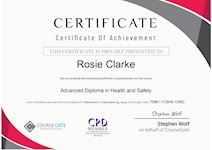Level 3 Teaching Course - CPD Accredited
Exam Included . CPD Accredited Qualification . Lifetime access . Immediate Result
Course Gate
Summary
- Exam(s) / assessment(s) is included in price
- Tutor is available to students
Overview
Level 3 Teaching Course is accredited by CPD and suitable for anyone aspiring to or already working in this field or simply want to learn deeper into level 3 Teaching Course.
To make this course more accessible for you, we have designed it for both part-time and full-time students. This course is packed into bite-size module for your convenience. You can study at your own pace or become accredited within hours!
If you require support, our experienced tutors are always available to help you throughout the comprehensive syllabus of this course and answer all your queries through email.
Some people consider the teaching profession only loaded with never-ending paperwork. However, it’s also a profession that’s filled with premia that surpass the tribulations.
The Level 3 Teaching Course is meant to introduce you to the theoretical considerations and practical experience that help you become a great teacher. This innovative course will provide you with a multiracial educated program consisting of several informational modules.
Additionally, you will understand the skills and experience required to become an efficient teacher, and how to turn your ability and enthusiasm into a rewarding career.
CPD
Course media
Description
What will you learn in this Level 3 Teaching Course
Module 1
In this module you will learn all about Understanding the Development of Children and Young Person. Child development is a process every child goes through. The sequence of a child’s development, also known as developmental milestones are divided into five different aspects: Physical; Social, Emotional and behavioural; Communication and language; Intellectual and cognitive.
Module 2
This module will teach you about Communication and Professional Relationships with Pupils and Family. Good communication is central to working with children, young people, families and carers. It helps build trust and encourages them to seek advice and use services. It is key to establishing and maintaining relationships and is an active process that involves listening, questioning, understanding and responding. You should always communicate with them appropriately to match the stage of development, personal circumstances.
Module 3
In this module you will learn all about Safeguarding the Welfare of Children and Young Person. The term ‘safeguarding’ describes the broader preventative and precautionary approach to planning and procedures that need to be in place to protect children and young people from any potential harm or damage.It is about more than child protection.
Module 4
This module will teach you about Teaching in the UK. The education system in London and the United Kingdom provides a lot of flexibility in terms of where teachers can work. The majority of jobs offered through Teach Away are in England, specifically in the greater London area. Many teachers choose to supply teach when they arrive in order to gain experience and get a feel for the different types of teaching assignments.
Module 5
In this module you will learn all about Teachers’ Standards in UK. Teachers make the education of their pupils their first concern and are accountable for achieving the highest possible standards in work and conduct. Teachers act with honesty and integrity; have the strong subject knowledge, keep their knowledge and skills as teachers up-to-date and are self-critical; forge positive professional relationships, and work with parents in the best interests of their pupils.
Module 6
This module will teach you about Teachers Pay. Teachers’ pay is heavily regulated and set at the national level. Some teachers earn high salaries, but these are usually head teachers or other senior managers: traditionally, the way to reach higher pay levels for teachers has been to take on management responsibilities, reducing the time they spend teaching. Because of the structure of teachers’ pay it can also take a long time to reach this level of income.
Module 7
In this module you will learn all about The English School System. In England, pre-school education is available for children aged two and over through nursery schools and playgroups. All children are entitled to up to six terms of free early education from their third birthday (and there is a government commitment to extend the provision to two-year-olds in the future). Education is compulsory from the beginning of the school term after a child’s fifth birthday until the end of the academic year in which the child reaches the age of 16.
Module 8
This module will teach you about Evaluation of Schools and Teachers. There are three main components to the system of evaluation and monitoring used in English schools. The first is Ofsted (the Office for Standards in Education, Children’s Services and Skills), the independent governmental department charged with inspecting schools and publishing reports based on their findings.
Module 9
In this module you will learn all about School Governance. All schools in England are run by a governing body composed of members elected from amongst parents and staff, members appointed by the Local Authority, members appointed by the church or charitable foundation that owns the school premises, and members appointed from the community (e.g. local businesses). The school governing body sets the strategic direction of the school.
Module 10
This module will teach you about Inclusive Teaching. With a greater emphasis today on equality, diversity and inclusion (EDI) we should revisit our teaching and engage with the learning needs of all students by adopting inclusive pedagogies. By inclusive we mean valuing the contribution of students regardless of their backgrounds and appreciating the contributions of different value systems.
Module 11
In this module you will learn all about Chapter I. Education is a group enterprise. We establish schools in which we seek to develop whatever capacities or abilities the individual may possess in order that he may become intelligently active for the common good.
Module 12
This module will teach you about Chapter II. After deciding upon the aims of education, the goals towards which all teaching must strive, the fundamental question to be answered is, “What have we to work with?” “What is the makeup with which children start in life?” Given a certain nature, certain definite results are possible; but if the nature is different, the results must of necessity differ.
Module 13
In this module you will learn all about Chapter III. Attention is a function of consciousness. Wherever consciousness is, attention must perforce be present. One cannot exist without the other. According to most psychologists, the term attention is used to describe the form consciousness takes, to refer to the fact that consciousness is selective.
Module 14
This module will teach you about Habit in its simplest form is the tendency to do, think, or act as one has done, thought, or acted in the past. It is the tendency to repeat activities of all kinds. It is the tendency which makes one inclined to do the familiar action rather than a new one.
Module 15
In this module you will learn all about Chapter IV. Habit in its simplest form is the tendency to do, think, or act as one has done, thought, or acted in the past. It is the tendency to repeat activities of all kinds. It is the tendency which makes one inclined to do the familiar action rather than a new one. In a broader sense.
Module 16
This module will teach you about Chapter V. There is no sharp distinction between habit and memory. Both are governed by the general laws of association.They shade off into each other, and what one might call habit another with equal reason might call memory.Their likenesses are greater than their differences.
Module 17
In this module you will learn all about Chapter VI.Imagination is governed by the same general laws of association which control habit and memory. In these two former topics the emphasis was upon getting the desired result without any attention to the form of that result.Imagination, on the other hand, has to do with the way past experience is used and the form taken by the result.
Method of Assessment:
Upon completion of the course, you will be required to sit for an online multiple-choice quiz based assessment, which will determine whether you have passed the course (60% pass mark). The test will be marked immediately and results will be published instantly.
Certification
After successfully completing the course, you will be able to obtain the certificates. You can claim a PDF certificate by paying a little processing fee of £2. There is an additional fee to obtain a hardcopy certificate which is £9.
Who is this course for?
Level 3 Teaching Course is suitable for anyone who want to gain extensive knowledge, potential experience and professional skills in the related field. This course is CPD accredited so you don’t have to worry about the quality.
Requirements
Our Level 3 Teaching Course is open to all from all academic backgrounds and there is no specific requirements to attend this course. It is compatible and accessible from any device including Windows, Mac, Android, iOS, Tablets etc.
Career path
This course opens a new door for you to enter the relevant job market and also gives you the opportunity to acquire extensive knowledge along with required skills to become successful. You will be able to add our qualification to your CV/resume which will help you to stand out in the competitive job industry.
Questions and answers
Currently there are no Q&As for this course. Be the first to ask a question.
Reviews
Currently there are no reviews for this course. Be the first to leave a review.
Legal information
This course is advertised on reed.co.uk by the Course Provider, whose terms and conditions apply. Purchases are made directly from the Course Provider, and as such, content and materials are supplied by the Course Provider directly. Reed is acting as agent and not reseller in relation to this course. Reed's only responsibility is to facilitate your payment for the course. It is your responsibility to review and agree to the Course Provider's terms and conditions and satisfy yourself as to the suitability of the course you intend to purchase. Reed will not have any responsibility for the content of the course and/or associated materials.




